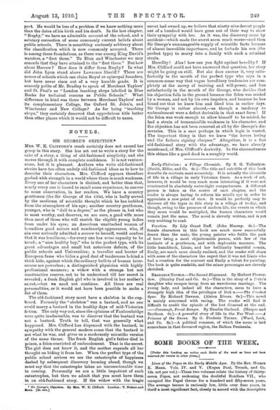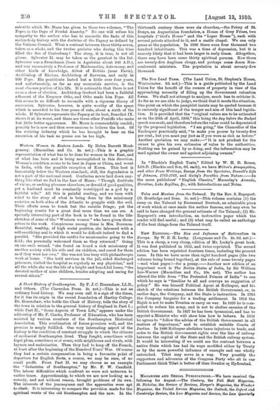SOME BOOKS OF THE WEEK.
[Na.r the heading we notice such Boobs of the week se have net hen reserved for review is other forms.] Lives of the Popes in the Early Middle Ages. By the Rev. Horace K. Mann. Vols. IV. and V. (Kegan Paul, Trench, and Co. 12s. net per voL)—These two volumes relate the history of thirty. seven Popes, not reckoning the doubtful Boniface VII., who occupied the Papal throne for a hundred and fifty-seven years. The average tenure is curiously low, little over four years, in itself a most significant fact, closely in accord with the descriptive
sub-title which Mr. Mann has given to these two volumes, "The Popes in the Days of Feudal Anarchy." No one will refuse his sympathy to the author who has to reconcile the facts of this melancholy history with the doctrine of the Papacy as defined by the Vatican Council. What a contrast between these thirty-seven, taken as a whole, and the twelve prelates who during this time filled the See of Canterbury ! The story, it is true, is not all gloom. Sylvester II. may be taken as the greatest in the list. Sylvester was a Frenchman (born in Aquitaine about 940 A.D.), and was successively a Professor of Mathematics, Astronomy, and other kinds of knowledge, Abbot of Bobbie (near Pavia), Archbishop of Rheims, Archbishop of Ravenna, and early in 999 Pope. His pontificate lasted but a little over four years, and unfortunately, as far as any memorials survive, is the most obscure portion of his life. It is noticeable that there is not even a show of election. Archbishop Gorbert had been a faithful adherent of the Emperor Otho, and Otho made him Pope. All this seems to us difficult to reconcile with a rigorous theory of succession. Sylvester, however, is quite worthy of the space which is accorded to his four years of rule, about a sixth of the whole. If Sylvester represents the Papacy at its best, Benedict IX. shows it at its worst, and there are three other Pontiffs who make but little better appearance. Mr. Mann is commendably candid; poss:bly he is now and then over-anxious to believe the best. Of the untiring industry which he has brought to bear on the execution of his task no praise can be too high.







































 Previous page
Previous page